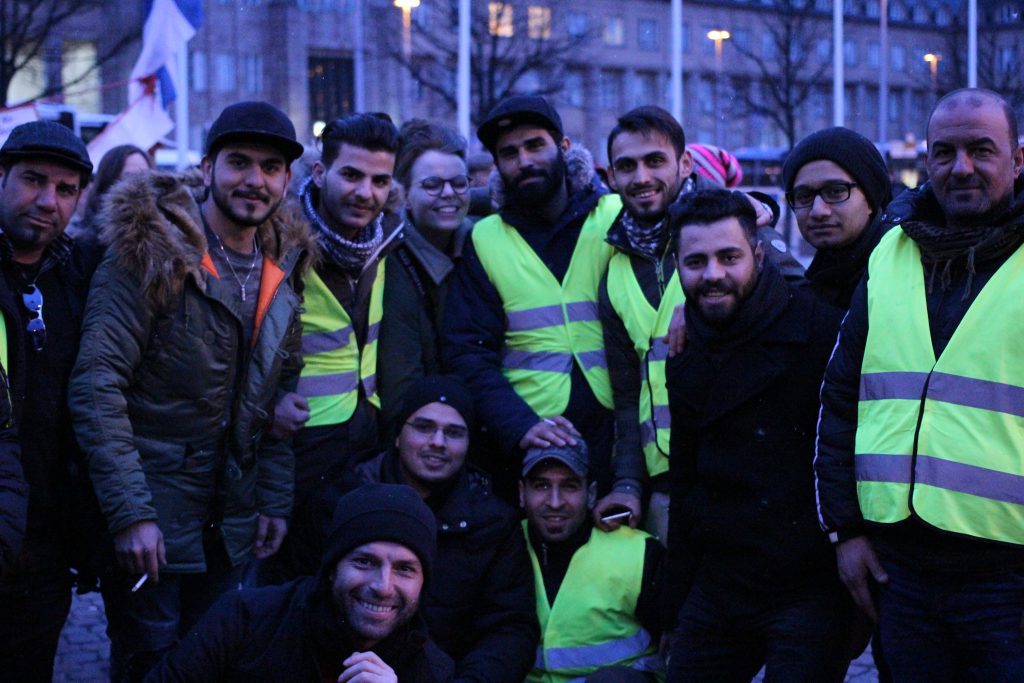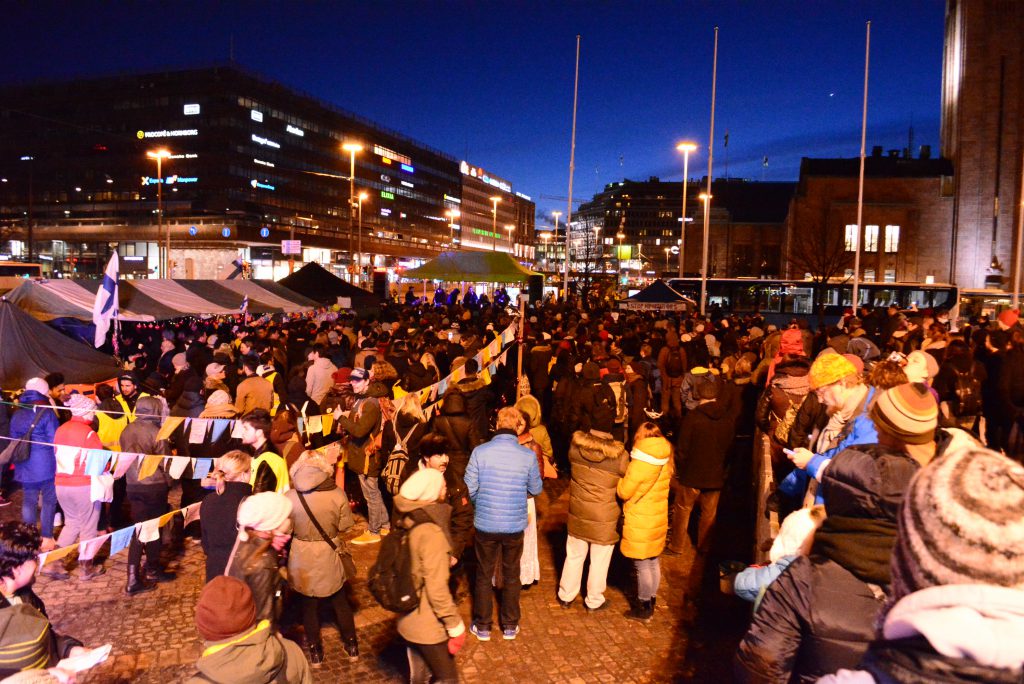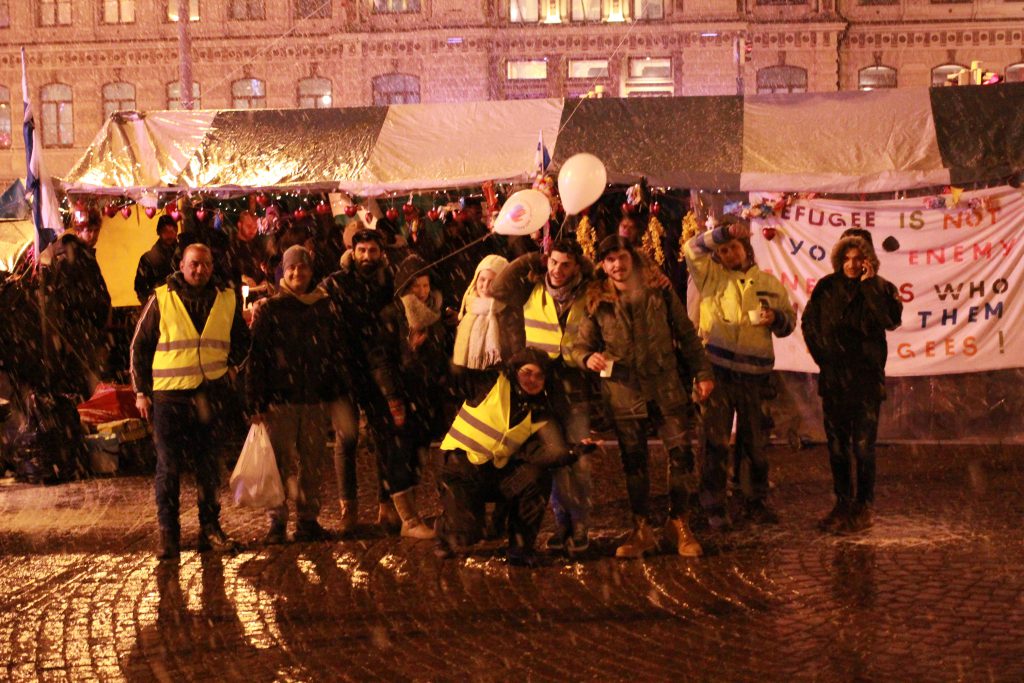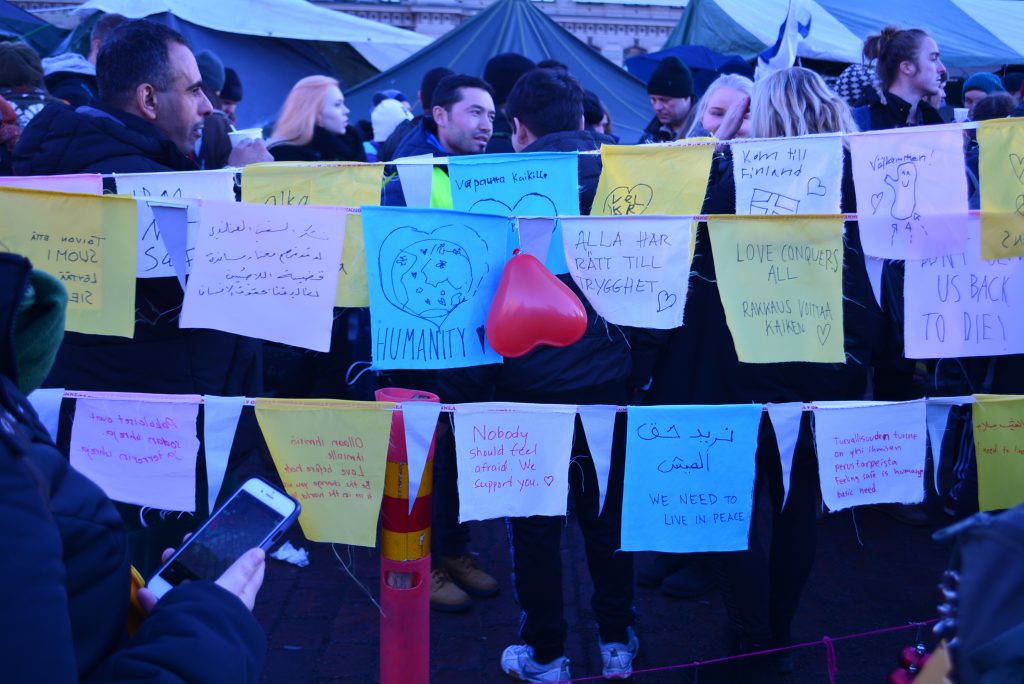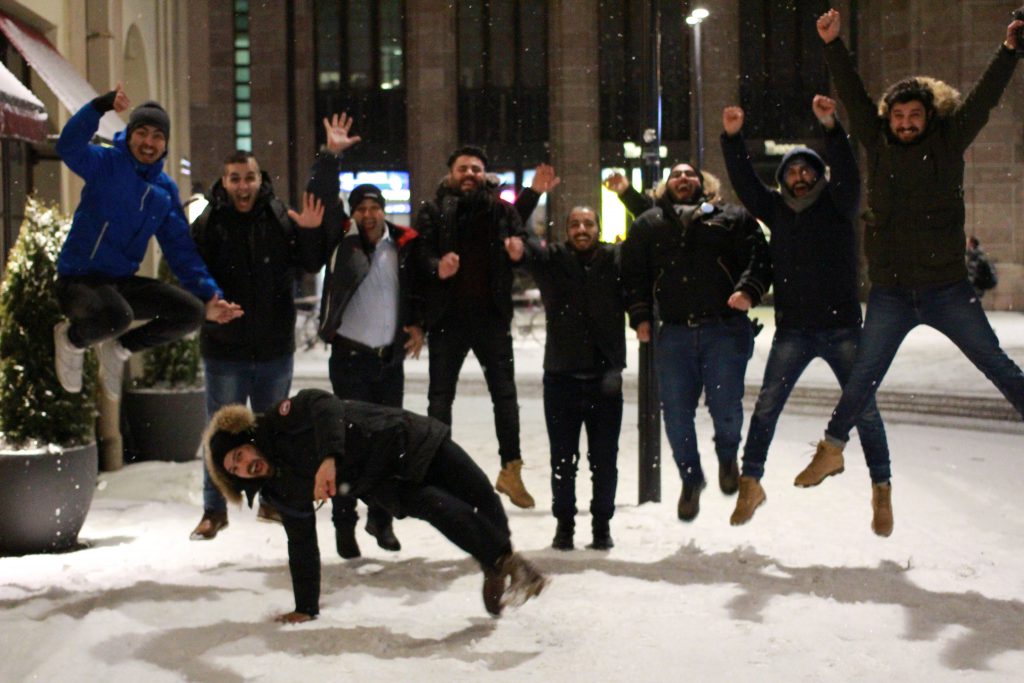Signal 3 Discussion Notes: Did We Change Anything?
19.9.2018
Compiled by Outi Popp
Discussion Notes: Did We Change Anything?
In 2017, asylum seekers and their supporters organised a five-month demonstration at Railway Square, in the heart of Helsinki. A year later, in May 2018, three of the organisers—Haider from Iraq, and Mohammed and Ghulam from Afghanistan—met to discuss the demo and its effects.
Let’s hit the streets.
Haider: We organised a demo in Senate Square on 3 December, 2016 with hundreds of people, but we didn’t get much attention, only two minutes on the Swedish-language YLE News. After that, there were a lot forced deportations, and they sent people to the Metsälä Detention Centre. A 19-year old guy was deported, and he sent me a video from Istanbul Airport. He said they had put a belt on his body and told him not to move, or the belt would give an electric shock. I started to look for Finnish activists. I sent a message to the Oikeus elää people1—I was already translating for them. I knew Harri, I called Sofia and Johanna, and went to Coffee Without Borders2 and met Annastiina and Mohammed.
Mohammed: Two weeks before the start of the demonstration in front of the contemporary art museum Kiasma, Haider came to Coffee Without Borders and explained what he had been doing with MigriLeaks3 and other activist groups. He told us that there are lots of deportations, and he wants to hit the streets. We at Coffee Without Borders gave him our support.
Haider: I wanted to sleep in front of the parliament and Migri (The Finnish Immigration Service) until someone from [the] government asks us asylum seekers, “what are you doing here?” To get attention from the media. Activists helped me with the tents and I invited all asylum seeker friends to join. I came from Turku with 300 breads, we set the tents on Kiasma Square, and people started to come. I thought I will be alone, but there were 25 to 30 persons on the first day, on the second day 40, on the third day 50 persons. Then Johanna said that the Afghanis want to join.
Mohammed: I came with Finns and a drumming group on day one, as a supporter, not an organiser. After three days, Marjaana told me that people were quite tired, so if I wanted to join I could do it. My friends Murtaza, Rajaf and Qasim spent the night and brought powerbanks to people. In my room there was eight plus Sadiq who wanted to get involved. Amir was active on social media. Johanna and I spoke to Haider and it was on the fourth or fifth day that the Afghanis joined. People were desperate.
Haider: The first days were really horrible because there was no food. So we started collecting money for food. Jihad was cooking with Odei. We were 12 persons, the same people who had organised the first demo in Senate Square. Me, Jihad, Haider, Walid, Odei, Ali. Then Mohammed, Bashar, Ali, Samer, Qasim, Khalil, AJ, Motaz, Abunur, Ahmed, Firaz and others joined us.
First I got permission for just two days. But we didn’t get attention. Should we continue, how can we pay for the tents? Then Valtteri came and told us he got a tent, so we continued for another two days to find anyone interested in seeing the deportation videos.
MP Ville Niinistö from the Greens Party came, and I pushed him to put anything to social media about asylum seekers. I asked him to tell other parliament members to visit us. He wrote something on his Facebook page and got a lot of hate messages from racists. The media wrote about that. Then came Emma Kari from the Greens, Li Andersson from the Left Party, Eva Biaudet from the Swedish Party. We sat with Eva by the fire and took a picture, which she put in her Facebook wall. After a while she removed it, because of the hate messages.
Then the media started to visit every day. More and more people came. And we asked for two days more from the police, saying we are trying to get someone from the government. Interior minister Paula Risikko came, and I showed the deportation videos and discussed our demands, and she told us to give her the demands on paper. So we started to write the demands with activists and lawyers.
Again we asked for permission to continue, and now we said that we need more government parties to come. The Yle Kioski TV programme made a live video when MP Sampo Terho from the Finns Party came to visit the demo. Then the police said, “now you can move”, and we said, “we are not moving until someone from the immigration service, Migri, comes”. We just tried to make it longer and longer.
The police said they couldn’t guarantee our safety at Kiasma Square, and they took me and Marjaana to their car and asked us to pick another spot. So I picked Railway Square. Police said there will be two spots, one for us and one for the racist counter demonstration of Suomi Ensin.
Hard Days at Railway Square
Mohammed: Me, Marjaana, Miro and Haider negotiated for at least one hour with the police to be able to relocate instead of abolishing the demonstration, and finally the police agreed to relocate the demonstration tent to Railway Square, with the condition that no one should sleep inside the tent. The first night was the most horrible one I have witnessed in Finland. It started to rain and it was freezing. There was no way we could keep ourselves warm.
It was very difficult to organise night shifts. I remember that on the first night I had to leave the tent because there were at least 20 people, and I thought I have to rest for tomorrow night. Once I came the next day I didn’t leave the demonstration tent for three consecutive days and nights due to a lack of people staying over for the night shifts.
There was a lot of media fuss around the demonstration. Plenty of Finnish citizens, politicians, and journalists came to visit the demonstration. Finnish citizens came with misconceptions and talked with us and got to know what the demonstration really was about. For example, some people had thought we were homeless. In my opinion, those first few days at Railway Square paved the way for the media to discuss the topic and highlight it, that there is a crisis in the immigration services. It made the whole country aware that there are thousands of asylum seekers in Finland, as every day different papers wrote something about asylum policies and the numbers of asylum seekers living in different reception centers.
Haider: In the first few days there were no general meetings in Railway Square. Just discussions in the middle, of lot of discussions. I just tried to find a way to continue, day after day. The permission from the police was each time for two more days, two more days, two more days.
After ten days there was food, there was a tent and there were grills. People who didn’t have any shelter because they had been kicked out from the camps started to come to the demo. Then one morning the police surrounded us and said the manager of Migri is coming. Jaana Vuorio said that we shouldn’t stay in Railway Square, and invited us to Migri instead.
So the authorities played, and we did the same. And now every single moment there was a visitor. And the racists came too. They would send drunk people to just fight with us in the night. It was very hard for me to keep our guys from fighting with these persons, who were pushing, harassing and talking bullshit. I had to explain to the guys that we are here sending a message to all of Finland. So please do not get provoked. They were really hard days, but everyone was responsible. It was good that the Finnish activists in the night shifts explained the roles and the culture here, what we should do.
In the beginning of the demo I made live videos in the street, interviewing people. ”We are asylum seekers from Iraq, we are here, what do you think about us? Do you want me to stay?” They didn’t know us. Some people said people just try to get a better life here. Some people said refugees really need a safe place. When they crossed the sea they were near to death, so they must really have a good reason. There were a lot of different opinions. Face to face conversation helps many people understand.
Migri Didn’t Give a Shit
Haider: So we sent a delegation of ten Afghanis and ten Iraqis to Migri.
Mohammed: I had written three demands in three sentences, and I had emailed them to all the Afghanis. Sadiq called me and said that our demands are really shitty, we need to think more.
Haider: The Afghans were disappointed because of the agreement between the EU and Afghanistan, that Afghanistan receives the returnees.
Mohammed: The bilateral agreement signed in September 2016. When we went to Migri we asked, “why are people being deported to Afghanistan, when they have never lived there?” And they just said, “this is how it is. Our government has the agreement with Afghanistan and it’s gonna go on”.
Haider: And we asked Migri, how can they deport people to Iraq without an agreement with Iraq? The joint demand was that asylum seekers and families who are kicked out from reception centres should get help, because they cut the camp services when people get negative decisions. They didn’t even get medical help. The big organisations in Finland were trying to open some kind of shelters for homeless people. When I later in February talked to the prime minister, I asked him “how can you kick out families?” That same day a family with four children was kicked out from the camp to the street. Even the cities didn’t support asylum seekers.
Mohammed: The church supported those who were thrown out of the reception centres, they had a few beds for homeless people who came from a Roma background, and they also had a shelter in Lauttasaari. But there were not enough beds.
A lot of our people said that we have to go to Migri. When we went to Migri and returned, many Afghan asylum seekers were kind of hoping for good news, but we told them what we had heard from the head of Migri, that the government and Migri don’t give a shit about us asylum seekers. That they are not going to change anything, no matter how many times we will have a dialogue.
Haider: Many people thought we will get permits for everyone, that we will fix things.
Mohammed: When we told them it is not going to happen, a lot of people left. After that it was really difficult to keep the same group of people doing the night shifts and timetable. There were a lot of internal arguments and disagreements, and friends becoming enemies.
Demo Rules
Mohammed: I spoke to Amir, Sadiq, Ghulam, Yama, Tariq and everyone who did night shifts. And we wrote an agenda, how to be in our community. A manifesto about what it means to be involved with activists. Because there was a lot of ethnic and religious division in our community. And if anyone didn’t believe in the manifesto, they could not be involved with demo. It was formulated on the fifth day in Railway Square, and everyone had to sign it. A lot of people did not agree.
For people who come from Afghanistan, the ethnic and religious lines are very divisive. We had written in our manifesto that we do not hold any ethnic or religious bias. We also had to discuss the issue of the sexual and religious orientation of other asylum seekers who came to the demonstration—i.e. that if you come across people who come to you and join the demonstration, and they are sexually oriented in a different way than you are, you have no right to tell them what to do or how to behave. If you come across someone who is atheist or Christian, this is not the platform to debate about it.
Haider: We also organised a big meeting, some 25 people. We explained the same things. If you are here as a Christian, Muslim, Buddhist, we do not open any discussion about religion, about sexuality, about your personal life. We made rules that everyone should accept. No discussion about your personal case, we had a big issue here. Then Dallu with some gay friends and one trans person came to the demo, and some people in the demo didn’t approve of them. People came from a different culture, they didn’t know anything about those issues. So we gathered a big meeting in a circle, and I was in the middle shouting that we should understand this. I tried to explain gay culture and LGBT people. Dallu and others were very happy and joined the demo after that. And everyone started to speak with them and they felt at home. I was really happy about it, because the demo speaks for everyone.
I remember in Ramadan when the Muslim culture came, Amiirah and others spoke about Islam and fasting. Erna spoke about atheists and Christians too. Dheyaa explained about Buddhism. Everyone was in the demo as family. No difference with any person, whether you are LGBT, religious—we stood there for one purpose, for asylum seekers and to stop deportations, everyone has the right to live.
Haider: Marjaana came to me and said that some people don’t want Roma people here, what do I think about that? I said everyone is welcome. At that point we were cooking food in the demo. The Roma were there every day and we were happy. If they hadn’t come, the food would have been left over.
The demo started to feel like home, a place for gathering for the activist network we built. If someone from any camp had a problem and didn’t have a lawyer, but wanted legal advice, they sent them to the demo. Some people had medical problems, they needed a doctor or an operation. It was a spot for advice, there were a lot of things. Day after day we understood that we can’t go back, we cannot leave the demo. On the contrary, it started to expand. People from many cities came to the demo. Oulu, Kemi, Kuopio, Vaasa, Turku, Tampere. Some people contacted me that they cannot attend the demo because it is so far. So we decided to support people to organise their own demos.
Bad News and Good
Mohammed: The most disappointing thing for me was to check what the news is saying—after two months of the demonstration, it was always bad reports. There was no discussion, they didn’t seem to think there is a crisis going on: people are becoming homeless, but nobody wanted to report about it.
Haider: That was why we started this demo. All the media was interested in was the bad news. If an asylum seeker raped a woman, or an asylum seeker stole something. No one was sharing the good news. But the demo also started to share good news, what the asylum seekers are doing. The demo changed people’s minds. This old couple from Kaskinen sent me a message every time I was in the news. ”We hear you!” They told me all the positive things they had heard from the media and articles, and they said maybe now the situation of asylum seekers will improve. Of course it does not work like that with the government. But a lot of Finns understood the reality of the Afghani and Iraqi people because of the demo.
Ghulam: We went to the City Council to speak about the paperless people who were kicked out of the reception centers with Tariq, Nour Jamal and others to voice our demands. With Motaz, we explained the situation of asylum seekers to party members. We got a lot of invitations to talk.
Racism Inside and Outside
Mohammed: We said we needed to create a safe space in the demonstration. But the way some Finnish activists spoke to asylum seekers was sometimes rude and racist. I did many night shifts and didn’t pay any attention to the racists, so they didn’t provoke me. But when Iraqis or Afghanis interacted with the racists, a lot of Finnish supporters would say that “you guys have it in your nature to be violent and aggressive so you better not interact with racists”. It was upsetting to hear such comments from the supporters, and naturally the racists would go on a full ranting of verbal racial abuse, and sometimes they would try to get physical as well.
Many asylum seekers had never sat with Finns for a five minute conversation. But during the night shifts, they suddenly spend three to four hours with a group of Finns. It took a lot of patience sometimes to sit there.
Whenever there was an incident and we had to call the police, the police patrol that came was very rude. They made us feel less of human beings, with the way they ignored us if we were attacked by drunks or racists. If it was the other way around—that we attacked the racists or the drunks—I am sure the police would have acted differently.
Haider: My idea was to talk to the racists and maybe make them understand reality. With most of them we did not succeed. But if someone asked, why me, why I am here? I wanted to tell why I’m here. That was one reason for the demo.
Ghulam: I explained to a lot of Finns the situation in our country, in the reception centres and the asylum process. There was a woman who came to the demo, she had been drinking and she was extremely angry and told me, ”Go back to Iraq! You are not from here. We don’t trust you. You are Muslims”. I explained our situation, and after that she cried and said she hadn’t known. Someone had told her all asylum seekers are just Muslims who cannot be trusted and need to be got out. She is one of my friends now, and now many people know about our struggle.
Haider: Thousands and thousands of people came to visit the demo. We got a lot of friends there. Sometimes when I walk in the street or go to a bar, people say ”You are the guy from the demo!” When I went to see and rent an apartment, the landlord said: ”I remember you!” He was one of the persons I had interviewed in the Railway Square, and then he had said everyone has the right to live here if they do it legally, and are in need of asylum. Now he’s my landlord and one of the best people I have in this life, he’s like a father.
Ghulam: People are all the time sending messages that they are ready if someone needs help. They could be just visitors that I met a couple of times in the demo. But when I ask for their help, they are ready. One family needed to go to the Pasila Police Station to get their asylum decision, they were very scared. But three women came to Pasila to accompany them, and the family felt safe.
Collective Act of Solidarity
Haider: We were just two or three Iraqis visiting Coffee Without Borders. But how many persons visited the demo! The demo became a gathering spot of good people, who have the humanity to help people they don’t know, they just know they need help. There was this young guy, who had made a mistake in this country, but the activists said, “we will try to help him, try to keep him alive. Whether he is good or bad, he should be alive”. I saw many people drunk, shouting, even destroying shops, stealing, that’s human life, but we should all be able to live and breathe. This point was very important for the activists.
A lot of people didn’t trust anyone. Especially the young guys, 17 or 18 year olds, do not know how to live in this community. They need somebody to guide them. They are just put in the middle of nowhere, live your life, you’re in Europe. And when they got negative decisions, I tried to speak with them: “why you are doing this, shaming us. When you’re doing something like that, all the asylum seekers will be affected, it will be in the news”. They said, “why should we care? These people don’t care about us. They throw us in the street, they give me negative. They want me to return and die”. They think like that. If this government gave them one chance! One guy got a permit. He’s with me now in the school. He’s studying, not doing anything wrong. Because he knows that he has future. But these people who don’t have any hope, you cannot wait for anything, you cannot even guide them, because they know nobody cares about them. But it’s important for them to meet someone that cares.
Mohammed: The demonstration brought a lot of activists together. Activists who were doing the same things on their own suddenly became part of a big collective. The collective act of solidarity meant more effective ways of working. Plenty of activists who were supporting asylum seekers through counselling and being legal support persons shared information, and discussed and learnt from each other. The activist’s counselling was very crucial as the lawyers were overloaded with work. Also some lawyers were not very professional, so the activists would do the lawyer’s work for them, with advice and support from the demo activist collective. The activists who were involved in lobbying the media came together and fed the media concrete proofs of how negligently, incompetently and unprofessionally the asylum interviews had been carried out. They brought up the problems with translators used in the Migri interviews. This resulted in Migri taking back a lot of cases for reevaluation.
The issue of asylum seekers—especially families with small children—becoming homeless was pushed towards the City Council. A lot changed afterwards in terms of social services providing homes and services for the families, and the Council passed a bill to fund the undocumented project, which provided a night shelter for undocumented single adult asylum seekers.
Asylum seekers and Finnish citizens networked, socialised and learned a lot from each other in the circle of the demonstration. The 24/7 demonstration in the middle of the city also made us asylum seekers adapt to the cold winters of Finland, so it was a good integration step.
We Didn’t Succeed in Changing Policy
Mohammed: The demonstration was one of a kind in Europe, as it went on for such a long time with total respect and care for our surroundings, the public, and the authorities. It went on to inspire Afghan asylum seekers in Sweden to start a 24/7 demonstration in Stockholm.
It was a big achievement in my view. Of course it is impossible to overturn the whole Migri policies by grass root activism and taking to the street, but we can be proud of the positive things we achieved. The negative things can be a lesson, such as the internal conflicts between the different communities of Afghans, Iraqis and Finns. I personally got to know the Afghan and the Iraqi people better. Both Afghan and Iraqi people take a lot of pride in terms of their identity, but Afghans are quiet and polite, whereas Iraqis are loud and straight to the point. This caused a lot of problems that were very frustrating at times.
Haider: I felt in the beginning that something will happen, when the Minister of Interior came, the parliamentarians came, and Migri came. That we will stay for another day. Maybe the Finns knew all along that we couldn’t get anything from this government, but we realised it only in the end, that we cannot change anything in politics. But day after day, I understood how much we changed in the reality between people, maybe even on a city level.
If you would tell anyone: keep ten, a hundred or 500 people for five months in the middle of the street and do not leave the place. I couldn’t possibly explain what I was in. It was complicated. The good thing is that it’s over—without shame. We were really happy in the end, and we marched to Migri with pride. I was crying. All the people were holding me and saying don’t worry. I was crying because we did not succeed. I didn’t succeed in changing the policy of this government, but it was impossible. In the beginning there was hope and dreams.
But what we did, there is no other country in Europe that had anything like this. Finnish activists, what you did to support the demo. If I was in another country, we would have not succeeded in maintaining it for five to six months like this. People together, Afghanis, Iraqis. Ghulam, Mohammed and Sadiq were the anchors of the Afghani community. The Iraqi community was difficult, with a lot of discussions. The main problem for me was, ”we started the demo, we don’t need anyone to help us. They should not get any benefit for themselves through our demo, and we did not get any benefit”. Sometimes when an Afghani was interviewed in an article, people compared how many lines they give to Afghanis and how many lines to Iraqis. And they would blame me! There’s always something different: the Iraqi community is different. The ideal for Iraqis is to do it the Iraqi way: if you deal in the Finnish way or the Afghan way, you cannot succeed.
I got a lot of bad comments from my own community. Why did I put myself into this? It was something inside me.
Ghulam: We had same problems with the Afghani community. Why didn’t you define us? Most of the complaints were about water. But it was amazing time.
Haider: In the general meetings, people maybe sometimes got really angry with me, but after the discussion we’d hug and go for drinks together. But some people thought we fight. But we have this network and connection with activists.
One Cause: to Stop Deportations
Haider: Imagine keeping twenty persons, Afghani and Iraqi together somewhere for ten days, not six months. Finns, keeping them together. Could you succeed?
It was one cause, one cause only, that made us stay there, in the street in cold weather. I remember every single day. Everyone was for one cause: Walid, Jihad, Motaz, Haider, Yama, all the people were standing there to stop the deportations. We just had hope. To get attention from supporters. From people, that they need us in this country.
Mohammad: Everyone in the demonstration worked towards the same cause and found their place and role.
Outi Popp is a writer and an activist of the Stop Deportations group.
Photos: Ali Rokan
1 Oikeus elää, i.e. Right to Live, A network supporting asylum-seekers and refugees.
2 An open, free-of-charge café hosted by the Free Movement Network.
3 A group that publishes facts about Finnish immigration policy, in order to draw attention to how cruel and inhumane the decisions of the Finnish Immigration Service are. For more, visit: migrileaks.wordpress.com
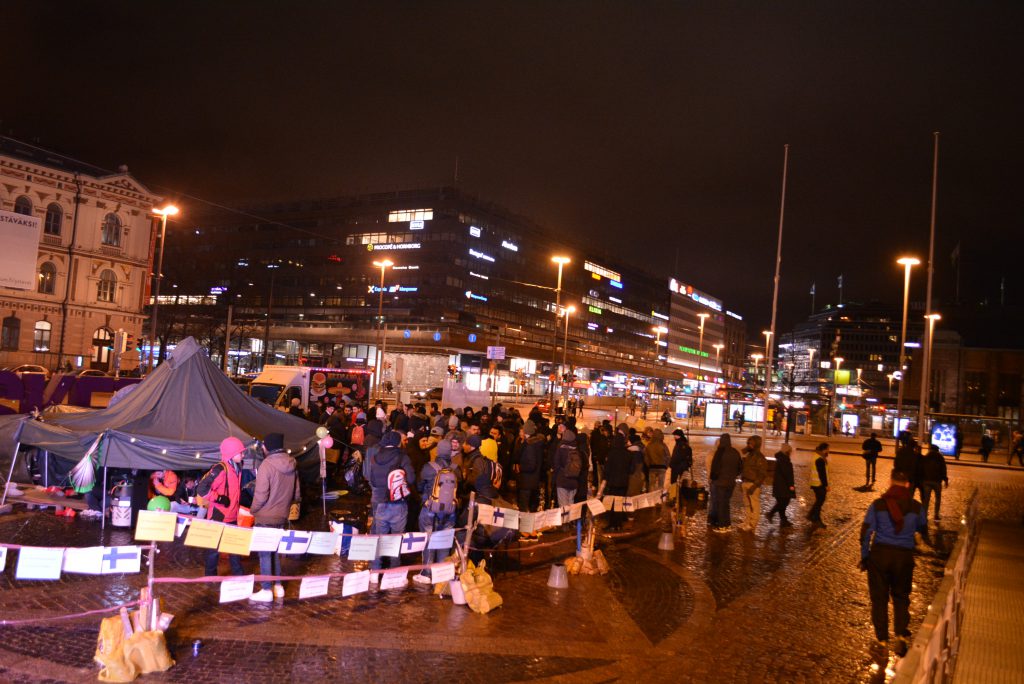 Photos: Ali Rokan
Photos: Ali Rokan